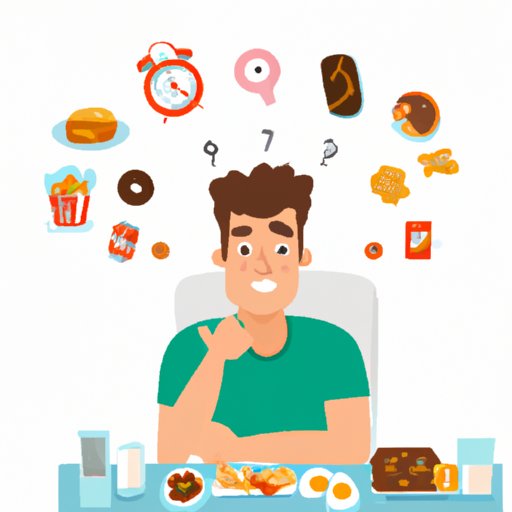
Introduction
Do you find yourself sneaking to the fridge late at night or reaching for a bag of chips before bed? Late night snacking is a common habit that many of us struggle with, but could it be the reason for unwanted weight gain? In this article, we’ll explore the connection between late-night eating habits and weight gain, the science behind it, healthy snack options and expert advice for breaking the cycle.
The Truth About Late Night Snacking and Weight Gain
It’s a commonly held belief that eating late at night could contribute to weight gain, but is there any truth to it? The answer is not black and white. While there is no direct relationship between the time of day you eat and weight gain, there are underlying factors that could play a role. For instance, the foods you eat when you’re burning fewer calories during sleep could contribute to a calorie surplus and weight gain.
Furthermore, some studies suggest that people who eat late tend to consume more calories overall than those who eat earlier, possibly due to a lack of nutrient-dense foods during the day or mindless snacking in the evening. So, while eating late at night won’t automatically lead to weight gain, it could contribute to an unhealthy diet, which eventually affects your overall health and weight.
Breaking Down the Science: Eating Late vs. Eating Early
Our body’s internal clock, also known as circadian rhythm, plays a vital role in regulating digestion and metabolism. Eating at irregular and unnatural times, such as late at night, could affect our digestive system’s function and have metabolic consequences.
Several studies have shown that eating late at night may not only increase the total number of calories consumed but also lead to poorer blood sugar control and higher insulin levels, which in turn, slow down the metabolism.
In contrast, eating earlier in the day and having breakfast has been linked to better weight management. People who eat breakfast tend to have a healthier diet, consume fewer calories throughout the day, and have a better metabolism that helps with weight loss.

5 Habits to Avoid When Late Night Cravings Strike
If you find yourself reaching for snacks at night, it’s important to be mindful of your choices. Here are five habits to avoid:
- Skipping Meals During the Day: Skipping meals during the day could lead to overeating later in the day or at night.
- Consuming High-Carb or High-Fat Meals: Meals high in carbohydrates or fats may not only make it harder to fall asleep but also leave you feeling tired and sluggish the next day.
- Drinking Alcohol Before Bedtime: Alcohol may cause you to fall asleep quickly, but it could also negatively impact the quality of your sleep.
- Eating in Front of the Screen: Consuming food while being distracted by screens or other activities could lead to mindless eating and overconsumption.
- Using Food to Cope with Stress and Emotions: Eating to deal with stress and emotions might provide temporary relief, but it’s not a healthy coping mechanism and could lead to a spiral of overconsumption.
Healthy Snack Options for Late Night Munchies
If you’re going to snack at night, it’s essential to choose healthy options that satisfy without adding extra calories. Here are some healthy snack options for late-night munchies:
- Low-Calorie and High-Protein Foods: Protein-rich snacks, such as nuts, seeds, and Greek yogurt, can help you feel fuller and more satisfied without adding too many calories.
- Vegetables and Fruits with High Dietary Fiber: Snacking on fruits and veggies with high fiber content, such as carrot sticks, apple slices, or celery, can help you feel fuller for longer while adding beneficial nutrients.
- Non-Dairy Milk and Yogurt Alternatives: Plant-based milk and yogurt alternatives, such as soy, almond, or coconut milk, can be a tasty, low-calorie option to satisfy your cravings.
- Homemade Snack Ideas: If you’re feeling creative, making your snacks at home from fresh ingredients can be a fun and healthy way to curb your cravings.
How to Control Late Night Eating to Prevent Unwanted Weight Gain
If you’re struggling with late-night eating, here are some tips to help you control your habits:
- Setting a Consistent Sleep Schedule: Establishing a regular sleep schedule helps your body maintain a healthy circadian rhythm and ensures you’re getting the right amount of sleep each night.
- Planning Your Meals and Snacks in Advance: Taking time to plan your meals and snacks in advance can eliminate impulsive snacking and encourage healthier choices.
- Practicing Mindful Eating and Portion Control: Being mindful of what and how much you eat and practicing portion control could help you avoid overeating and unhealthy habits.
- Using Hunger and Fullness Cues as a Guide: Listening to your body’s cues for hunger and fullness can help you eat when you need to and avoid overeating.
- Seeking Support and Accountability: Having a support system to hold you accountable and keep you motivated could make a big difference in maintaining healthy habits.
The Role of Sleep in Weight Management: Why Late Night Eating Can Sabotage Your Efforts
Sleep is an essential component of weight management, and poor sleep quality can negatively affect your metabolism and overall health. When you don’t get enough sleep, the hormones that regulate appetite and metabolism–leptin and ghrelin–are disrupted, leading to increased hunger and cravings.
Additionally, sleep deprivation contributes to insulin resistance, which makes it harder for our bodies to process carbohydrates and leads to higher blood sugar levels. This metabolic dysfunction can eventually lead to weight gain and a host of other health issues.
Expert Advice: Do’s and Don’ts of Eating Late at Night
To get professional insights on the topic, we reached out to Registered Dietitian, Sarah Smithson:
“Late-night eating habits can be challenging to break as they often have a strong emotional component. However, establishing healthy habits not only helps with weight management but also leads to better sleep, digestion, and overall health,” says Smithson.
Smithson’s advice for healthy late-night eating includes:
- Do: Opt for healthy, nutrient-dense snacks and plan your meals and snacks in advance.
- Do: Eat slowly and mindfully, paying attention to your hunger and fullness cues.
- Do: Have a consistent sleep schedule to help regulate your body’s internal clock.
- Don’t: Use food as a coping mechanism for stress or emotions.
- Don’t: Consume high-calorie, high-fat, or high-sugar foods regularly.
Conclusion
Late-night eating habits may not directly cause weight gain but could contribute to an unhealthy diet that negatively impacts metabolism and overall health. By understanding the science behind it and breaking down the habits that contribute to unhealthy eating patterns, you can make small changes that could lead to big results in managing your weight and improving your health. Remember, consistency, balance, and moderation in all things, including your late-night snacking, is key to maintaining a healthy lifestyle.




